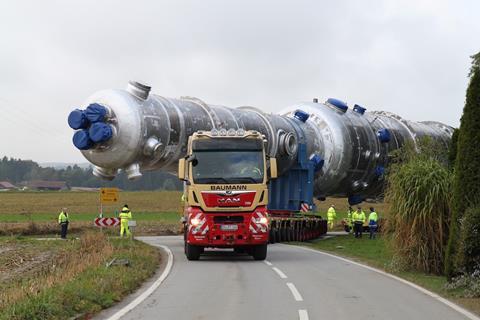A group of 31 economic, business and transport organisations have come together to increase the pressure on the German government to take urgent action to improve the heavy transport crisis in the country.

HLPFI has been tracking the developments in the German heavy transport sector with the help of the European association of abnormal road transport and mobile cranes (ESTA), which earlier this month wrote to the German government and the European Commission urging action to resolve the crisis.
The association has been vocal in its criticisms about the difficult conditions faced by large and heavy transport in the country, which include weak infrastructure and long delays in issuing permits, as HLPFI reported here.
The situation has now prompted the launch of Verbändeinitiative Großraum und Schwertransporte (VI GST) – the Association Initiative for Large-scale and Heavy Transport – to increase the pressure on the government. The initiative’s steering group includes Helmut Schgeiner, director of ESTA member BSK, the German heavy transport and crane association; Uta Maria Pfeiffer, head of mobility and logistics for the German Industries Federation (BDI); and Dirk Siewert from the German construction industry federation, Hauptverband der Deutschen Bauindustrie.
The 31 supporting organisations includes ESTA along with senior representatives from the engineering, equipment manufacturing, shipping and wind energy sectors as well as associations from across Germany industry.
VI GST has summarised its demands and goals in a detailed position paper sent to Volker Wissing, Germany’s federal minister for digital affairs and transport, and Robert Habeck, the federal minister for economics and climate protection.
In a statement accompanying its position paper, it said: “The current situation is no longer acceptable for the shipping economy and transport industry. The VI GST therefore acts as a joint platform for the shipping industry and the transport industry. The aim is to make a clear demand on politicians not to unnecessarily impede heavy transport and to use the existing scope to reduce bureaucracy in order to facilitate urgent relief.
“Large-capacity and heavy-duty transports are, among other things, a fundamental prerequisite for the implementation of infrastructure projects in business and in the public sector. The project processes of large projects are always individual and require long planning and preparation times.
“The increasing wear and tear of the transport infrastructure is currently being shown all too clearly by the large number of dilapidated bridges in Germany. This leads to considerable difficulties in the search for possible transport routes.
“The processing times for the authorities currently take weeks to months. Fixed project processes get out of joint, causing delays and cost increases. National strategies, such as the energy transition, will be impacted if, for example, wind turbines cannot be erected as planned due to transport problems.”
Among the specific measures outlined, the paper asks the government to:
- Overhaul the heavy transport regulations to make them more efficient and appropriate for current market conditions
- Accelerate and improve the permit application and approval procedure
- Maintain and expand the transport infrastructure and use it more effectively
- Rethink the new VEMAGS permitting system
- Introduce uniform and calculable fees; and
- Adjust the regulations so that loads that are undersize or underweight do not have to apply for a new permit.
ESTA director Ton Klijn is attending the meetings on behalf of the association’s members and the wider European heavy transport sector. He said: “This is a significant and important initiative and shows the depth of feeling and serious concerns of the transport industry and our clients.
“At ESTA, we will of course help our German colleagues in any way we can, but I would like to again stress that this is not just a German problem. Our members are taking heavy transports in and out of Germany on a daily basis and the difficulties are impacting all of us.
“But to look on the upside, this is an opportunity for the German government to turn this crisis into an opportunity, and lead all of Europe towards a series of sensible and long overdue policies to support heavy transport that will have a great and positive economic impact.”
VI GST’s full position paper, in German, is in the free section of ESTA’s website library, here.
















